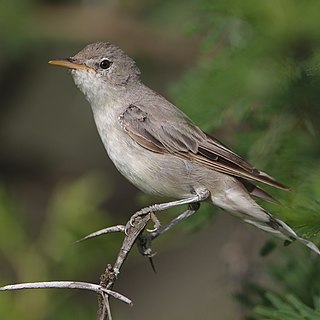
The olive-tree warbler is an Old World warbler in the tree warbler genus Hippolais. It breeds in southeast Europe and the Near East. It is migratory, wintering in eastern and southern Africa, from Kenya south to South Africa.
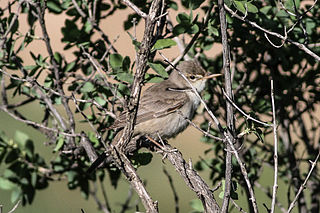
Upcher's warbler is an Old World warbler in the tree warbler genus Hippolais. It breeds in an area from Turkey south and east to Pakistan. It is migratory, wintering in eastern Africa, from Eritrea and Somalia south to Tanzania.

The plain prinia, also known as the plain wren-warbler or white-browed wren-warbler, is a small cisticolid warbler found in southeast Asia. It is a resident breeder from Pakistan and India to south China and southeast Asia. It was formerly included in the tawny-flanked prinia, resident in Africa south of the Sahara. The two are now usually considered to be separate species.

The ashy prinia or ashy wren-warbler is a small warbler in the family Cisticolidae. This prinia is a resident breeder in the Indian subcontinent, ranging across most of India, Nepal, Bangladesh, eastern Pakistan, Bhutan, Sri Lanka and western Myanmar. It is a common bird in urban gardens and farmlands in many parts of India and its small size, distinctive colours and upright tail make it easy to identify. The northern populations have a rufous rump and back and have a distinct breeding and non-breeding plumage while other populations lack such variation.

The green-backed camaroptera, also known as the bleating camaroptera, is a small bird in the family Cisticolidae. This bird is a resident breeder in Africa south of the Sahara Desert. Recent studies suggest this species and the grey-backed camaroptera may be the same species.

The graceful prinia is a small warbler. This prinia is a resident breeder in northeastern Africa and southern Asia, from Egypt and Somalia east to Saudi Arabia, where it is sometimes called streaked wren-warbler.

The chestnut-vented warbler, chestnut-vented tit-babbler or rufous-vented warbler is an Old World warbler.

The banded parisoma, banded tit warbler or banded warbler, is a species of Old World warbler in the family Sylviidae. It is found in Ethiopia, Kenya, Somalia, and Tanzania. Its natural habitat is dry savanna.

The Arabian warbler, also known as Red Sea warbler or Blandford's warbler, is a species of Old World warbler in the family Sylviidae. It is found in Djibouti, Egypt, Eritrea, Israel, Jordan, Oman, Saudi Arabia, Somalia, Sudan, and Yemen. Its natural habitat is dry savanna country where it is often found in patches of Acacia.
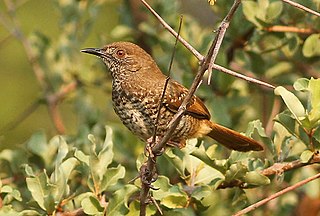
The barred wren-warbler or southern barred warbler is a species of bird in the family Cisticolidae.

The miombo wren-warbler, also known as the miombo barred warbler or pale wren-warbler, is a species of bird in the family Cisticolidae found in southern Africa.

The white-tailed crested flycatcher is a species of bird in the flycatcher family Stenostiridae. It has a discontinuous distribution in eastern Africa. There are three subspecies, E. a. albonotata of central Kenya, and Uganda through to south west Tanzania; E. a. subvaerulea, which ranges from southern Kenya to Malawi and E. a. swynnertoni of Zimbabwe and Mozambique.

The grey-capped warbler is a species of bird in the family Cisticolidae. It is monotypic in the genus Eminia. The grey-capped warbler is found in Burundi, Democratic Republic of the Congo, Kenya, Rwanda, South Sudan, Tanzania, and Uganda. It is a large, chunky, thin-tailed-warbler with a distinctive grey cap, a black band around its head, and a chestnut throat wrapping its neck. Grey-capped warblers maintain a diet of insects and other invertebrates, including caterpillars, moths, grasshoppers, and mantids.

The lovely fairywren, or lovely wren, is a species of bird in the Australasian wren family, Maluridae. It is endemic to northeastern Australia. Its natural habitats are subtropical or tropical dry forest and subtropical or tropical moist lowland forest.
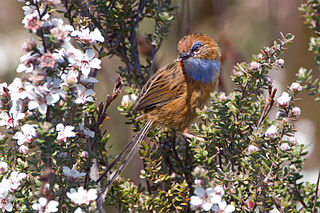
The southern emu-wren is a species of bird in the Australasian wren family, Maluridae. It is endemic to Australia. Its natural habitats are temperate forests, and Mediterranean-type shrubby vegetation, and swamplands.
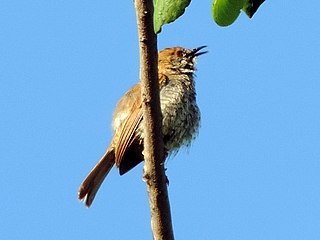
Stierling's wren-warbler, is a species of bird in the family Cisticolidae found in southern Africa. It is sometimes considered a subspecies of the miombo wren-warbler.



















